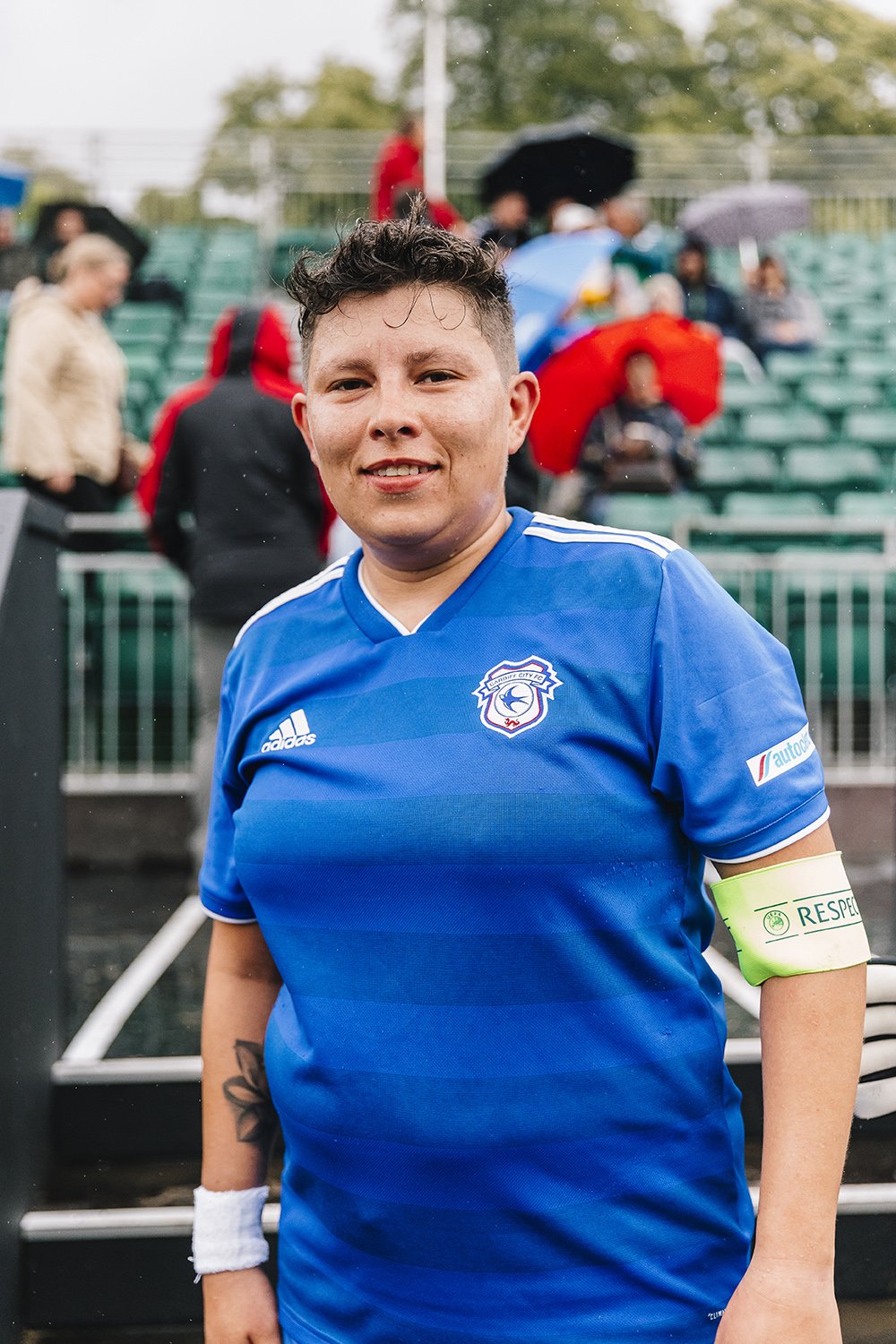“Nobody in the team knew each other before they came together here”
|Image: Mile44/Alayah Quinn
“The first time we put on the jersey it was so strange but a good feeling, like I’m doing something important. It’s so nice being part of the team. If you score the goal it’s not just you, it’s everyone. We are the family right now. And we are in the Cardiff City jersey—you never know what will happen!”
Johana Cardoza raises her gaze to the blue skies over Bute Park and absent-mindedly touches the tattoo on her right forearm—the word Familia with a cardiogram graphic—all she has to remind her of her birthplace. Then she grins, a huge, all-encompassing smile that belies her journey of the last four years.
A member of the all-female Street Football United (SFU) team, who hails from Colombia, is playing alongside other refugees and asylum seekers bound by the common thread of temporary statelessness.
“Nobody in the team knew each other before they came together here because everyone in the group is from a different country, including Saudi Arabia, Sierra Leone, and Congo,” Cardoza explains, “so we are ‘hello, hello, hello, we are the girls, we are the team, let’s go!’ All the managers around us help us to play, how to play better because I just played football when I was in college—last time was 2004—and the next time I played was one week ago!”
The 33-year-old Cardoza arrived in the UK in November 2015 seeking asylum and lived in north London before being transferred to Wales by the Home Office in December 2016. The smile fades as she recounts her previous life.
“I didn’t feel safe in my home country. I was a legal secretary working with the construction of buildings. I was involved with the lawyers, and when you try to make something good for someone else, the police and the government try to take that away. The corruption is too much.
“Where I was, a thousand people died in one day and the police did nothing because the government says it doesn’t happen.
“I felt my life was in danger because of my work. Every time I would go out I would always be looking around me, every time I heard the sound of a motorbike, my heart raced … So I had to completely change my life, never go out, keep changing my home, my city, my life.
“I love my friends, but when they asked me to come out I would say, ‘Oh I’m sorry, I’m tired, I can’t go, maybe next time’ because I don’t feel I can tell them I’m in trouble. Because if I’m seen with my friends it’s not just me who is in danger. I don’t want to involve my friends in my problems. For one person, a number of innocents can die. “
Once in Cardiff, she was put in contact with Oasis Cardiff (a local non-profit charity that aims to help refugees and asylum seekers) and began to slowly build a new life.
“I started from zero when I come to UK. I left my home, my family, my work. I lost absolutely everything.
|Image: Mile44/Alayah Quinn
“Before I arrived in the UK I didn’t speak a word of English—well, just yes and no—so the first thing I needed to do was know the language, to communicate with the people. I told myself, if you can’t talk with anyone you are nothing.
“Seeking asylum is a long, hard wait—I have been in court four times so far. It’s so much stress and depressing,” she continues. “You don’t know what’s going to happen to your life because it’s in the judge’s hands. You try to explain yourself, but you don’t really know what’s going on and all the time you’re waiting for news, waiting for a result. If no, what can I do, if yes, what’s the next step.
“I’m very lucky because Oasis has great people to support me and now I’m here, enjoying the experience, and making new friends from around the world. It’s amazing. This opportunity is amazing.”
Always looking ahead and building on any positives, her Homeless World Cup experience has inspired Cardoza to plan for her future.
“My mother, she knows I am playing here and is telling me to stay safe. It’s four years since I have seen her—I hope maybe I will be able to bring her here one day to visit.
“In the future, too, I want to go to college to learn correct English so I can get a job and then apply to university to get a good job and make my life better. It’s my responsibility. I need to look after myself—I have just one life and want to make it the best I can.”
A former hotshot at the table-tennis table, rather than a football supremo, Cardoza was initially encouraged to play by the manager of the Oasis Cardiff centre and has been supported in her participation by colleagues there and in the Homeless World Cup family.
“Many countries participate in the cup and it’s a nice experience, you make friends from different countries, and you can learn some words in so many languages.
“Wherever you go it’s ‘hi, hola, halo’, so it’s very nice. We are one, we are all in the same position, we are family. Here we are all one team. We are in the Homeless World Cup like a big amazing family!”
Words: Isobel Irvine
Images: Mile 44


